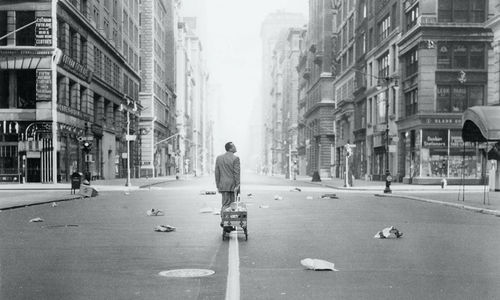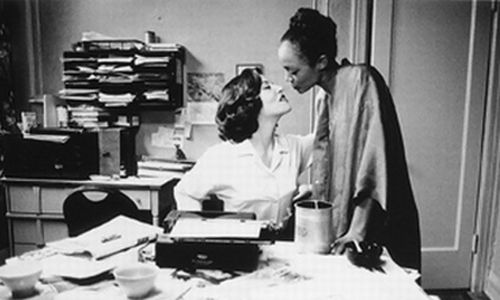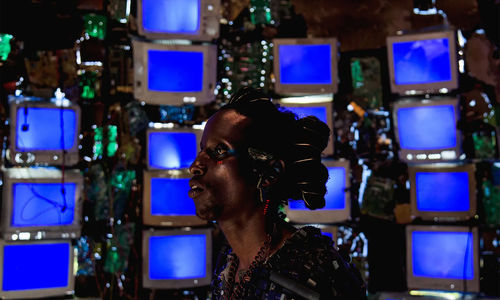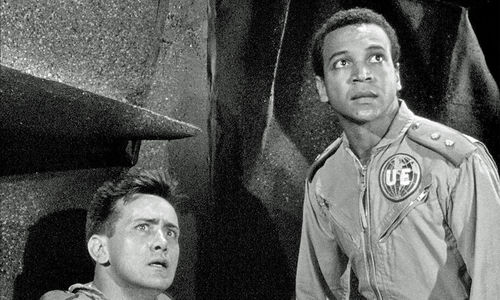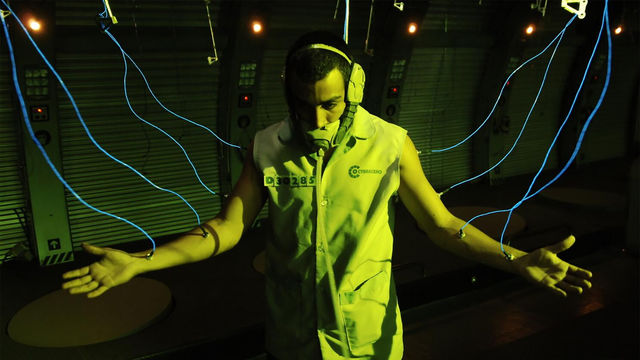
Labor: Sleep Dealer / Advantageous
- This is a past program
Presented by the UCLA Film & Television Archive.
Part of the UCLA Film & Television Archive screening series Science Fiction Against the Margins. Learn more at cinema.ucla.edu.
In-person: Introduction by filmmaker Kibwe Tavares. Q&A with filmmaker Alex Rivera moderated by Senior Public Programmer Paul Malcolm
The fraught and highly dependent relationship between humans and technology is fundamental to the science fiction film. In futures where humans must sacrifice their identity, both mental and physical, to support the hyper-productivity of a techno-capitalist world order that finds them disposable, humanity and the mechanical become intertwined. In these worlds, memories of history and dreams of a homelife and homeland are haunting symbols of what makes humans unique in their desire for love, passion, nurturing family lineage and self-determination.
Robots of Brixton (2011)
Robots of Brixton reimages, through 3D animation, the 1981 uprising in the South London Afro-Caribbean neighborhood of Brixton when community members challenged the police brutality they were experiencing. Kibwe Tavares creates a futuristic world where robots are the population. Although mechanical in structural design, they have assumed the human condition — the emotional experience that results from exploited labor, the stress of environmental and economic poverty, unsustainable urban development, and the discontent, anger and sense of dignity in the face of social injustice.
DCP, color, 6 min. Director: Kibwe Tavares.
Sleep Dealer (2008)
Sleep Dealer is the story of Memo (Luis Fernando Peña), who must leave his family’s homestead in Oaxaca after it is destroyed by a multinational corporation controlling the local water supply. Memo travels to Tijuana and finds a job in a factory where humans are wired to a cybernetwork through nodes attached to their bodies in order to complete virtual work across the border in the U.S.
Alex Rivera conceived of the story for the film in the late 1990s when antiimmigrant and border control rhetoric had reached a level of hysteria that coincided with the internet’s promise of creating a global village through a simple network connection. In this version of the future, easy telecommuting labor is made possible by the expendable remote Mexican worker. Memo meets Luz (Leonor Varela), a coyotech, an early social media influencer type, who sells migrants’ memories to a subscriber fanbase. Their relationship forces him to struggle with questions of morality in a dystopian world where a hardware semiconductor is the preferred method of human “connection.” In 2021, Rivera was the recipient of a MacArthur Foundation Award in recognition of his film and media work, in documentaries and narrative form, that focus on migration, human rights and the failure of immigration policies. Sleep Dealer, as a fictional film, continues to anticipate the present reality of the precarious nature of gig work, the threat to civil liberties of drone surveillance and the function of a border wall to prevent connection between all global citizens.
35mm, color, 89 min. Director: Alex Rivera. Screenwriter: Alex Rivera, David Riker. With: Luis Fernando Peña, Leonor Varela, Jacob Vargas.
Advantageous (2015)
Gwen (Jacqueline Kim) is a single mother struggling to sustain employment in a cutthroat biotech industry. As the marketing face for the Center for Advanced Health and Living, Gwen promotes radically altering plastic surgery that advertises to clients a “seamless jump into a disease-free body of your choosing.” Advantageous presents a feminist critique of biotechnology that sells a modern lifestyle obsessed with youth appeal and everlasting health at the expense of its women employees whose human qualities give them a limited shelf life. When Gwen is fired from the company in favor of a younger model, the facade of wellness-technology’s excellence crumbles to reveal a population in distress. The film is marked by women barely surviving in the gendered economic downturn. At first, they are quiet victims — crying neighbors and business owners on the brink of collapse — whom Gwen accidentally stumbles upon as her own financial instability pushes her closer to the edge. She must consider extreme life and body changes to safeguard her young daughter, in a future directed toward the past, where advancements in science and technology reinforce retrograde gender expectations based on the limits of unsustainable beauty standards.
Director Jennifer Phang collaborated with the film’s star Jacqueline Kim on the screenplay, and Ken Jeong co-stars in a rare and powerful dramatic role. The film was originally made as a short that was shown as part of the FutureStates series on the Independent Television Service and was developed into a feature that premiered at the 2015 Sundance Film Festival, where it won the U.S. Dramatic Special Jury Award for Collaborative Vision.
DCP, color, 91 min. Director: Jennifer Phang. Screenwriters: Jennifer Phang, Jacqueline Kim. With: Jacqueline Kim, Samantha Kim, Freya Adams.
The UCLA Film & Television Archive is a division of UCLA Library, and presents its public programs in the Billy Wilder Theater at the Hammer, among other venues. For more information about the Archive, visit cinema.ucla.edu.
ATTENDING THIS PROGRAM?
Ticketing: Admission to Archive screenings at the Hammer is free. Your seat will be assigned to you when you pick up your ticket at the box office. Seats are assigned on a first come, first served basis, limit one per visitor. Box office opens one hour before the event. Questions should be directed to the Archive at programming@cinema.ucla.edu or 310-206-8013.
Member Benefit: Subject to availability, Hammer Members can choose their preferred seats and pick up tickets for one additional guest. Members receive priority ticketing until 15 minutes before the program. Learn more about membership.
Parking: Self-parking is available under the museum. Rates are $8 for the first three hours with museum validation, and $3 for each additional 20 minutes, with a $22 daily maximum. There is an $8 flat rate after 5 p.m. on weekdays, and all day on weekends.
Read our food, bag check, and photo policies.
Read our COVID-19 safety guidelines.





